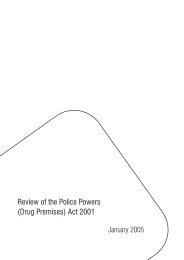Crimes (Forensic Procedures) Act 2000 - NSW Ombudsman - NSW ...
Crimes (Forensic Procedures) Act 2000 - NSW Ombudsman - NSW ...
Crimes (Forensic Procedures) Act 2000 - NSW Ombudsman - NSW ...
Create successful ePaper yourself
Turn your PDF publications into a flip-book with our unique Google optimized e-Paper software.
Given the widespread reluctance to conduct forensic procedures, some commands end up relying on one or two<br />
officers to conduct all their forensic procedure work. Some officers resent this:<br />
I’m sick of having to drop everything I do and go to another station (a custody station) and obtain the sample<br />
and then enter it up in the exhibits register. 288<br />
In some areas, reluctance to conduct forensic procedures has contributed to a low level of use of the powers<br />
available under the <strong>Act</strong>. One commander we interviewed said that in his command, there had so far been only one<br />
DNA match, and no eliminations, despite the <strong>Act</strong> having been in force for several years. He realised that officers were<br />
hardly conducting any forensic procedures, even though there were many occasions where suspects fit the criteria.<br />
He attributed this to a lack of confidence among officers and the perceived length of time it takes to conduct<br />
a procedure.<br />
The commands we audited had generally recognised this problem, and some had taken steps to address it.<br />
4.2.4. Education and refresher training<br />
We asked commands in our survey how often they ran forensic procedures training with 28 commands advising they<br />
conducted training at least once a year. Another 28 commands indicated they conducted training as the need arose.<br />
Some commands had not conducted any since the initial training when the <strong>Act</strong> came into force. In our view, officers<br />
should be required to complete refresher training in forensic procedures in order to remain accredited. It is clear that<br />
many officers have conducted very few, if any procedures, yet remain accredited.<br />
One command we audited, which had identified that it was conducting very few forensic procedures, focused<br />
on education and training as a way of encouraging officers to conduct procedures more frequently. It promoted<br />
examples of successful investigations involving forensic procedures, and publicised information about forensic<br />
procedures internally.<br />
Some officers we spoke to also suggested that videos of forensic procedures could be shown to the command so<br />
officers can see how procedures are conducted. Inexperienced officers could also start by getting involved in an<br />
easier role, like operating the camera, which may improve their confidence when it comes to conducting an actual<br />
procedure for the first time.<br />
4.2.5. Specialist forensic procedure units<br />
Another way of addressing widespread reluctance to conduct forensic procedures is to have a smaller group of<br />
officers who specialise in DNA and other forensic procedures. One command we audited had established a small<br />
team of officers who follow up links, investigate offences and interview suspects in relation to DNA. The command<br />
said this worked well, as these officers developed strong skills and experience in the area. Another command was<br />
canvassing the idea of having a specialist DNA unit within the command, but at the time of the audit, it was not clear<br />
whether this was possible given resource constraints.<br />
We support the idea of having a smaller group of specialist officers conducting forensic procedures. In most<br />
commands, we found that this was happening in practice anyway, as the command tended to rely on a small group<br />
of officers who were competent and confident to conduct forensic procedures, while large numbers of accredited<br />
officers were not conducting any.<br />
We also noted that in commands where a small group of officers conducted procedures on a regular basis and a<br />
senior officer had been appointed to oversee the process, there was greater compliance with the legislation. These<br />
commands also had clear policies that the staff were familiar with. Rather than avoid forensic procedures “like the<br />
plague,” we found the officers who routinely conducted forensic procedures demonstrated a good understanding of<br />
the legislation when interviewed and appeared confident and professional in the videos we watched. Several officers<br />
said they are comfortable with the legislation now, although it had been daunting at first:<br />
I don’t have any problems with it. I love it. It’s a hassle to do it, yeah the paperwork’s annoying, but it’s part of the<br />
legislation. You should use it. 289<br />
There is often criticism of the procedures by those who are not au fait with the SOPs. When an officer conducts<br />
a procedure it quickly becomes apparent that the actual procedure is straight forward. 290<br />
In our view, having a smaller group of officers who are specially trained in forensic procedures would promote<br />
consistency and would be of benefit both to police and the people undergoing forensic procedures. The officers<br />
46<br />
<strong>NSW</strong> <strong>Ombudsman</strong><br />
DNA sampling and other forensic procedures conducted on suspects and volunteers under the <strong>Crimes</strong> (<strong>Forensic</strong> <strong>Procedures</strong>) <strong>Act</strong> <strong>2000</strong>

















